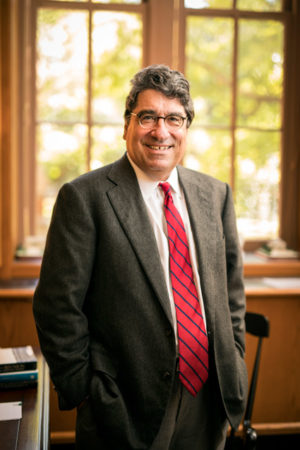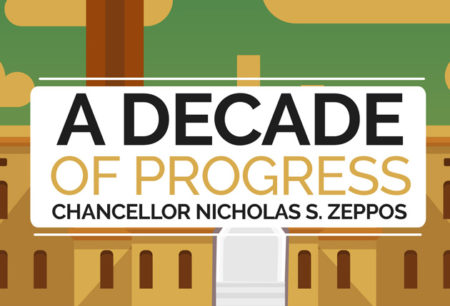Since Nicholas S. Zeppos became Vanderbilt’s eighth chancellor on March 1, 2008, all of the major initiatives he’s launched during his tenure address two broad priorities: enhancing access to educational opportunities and fueling discovery across academic disciplines.
In fact, to hear Zeppos speak today, he uses much of the same language to describe his goals as when he first began, down to the quote borrowed from Vanderbilt’s second chancellor, James H. Kirkland—“One never puts the finishing touches on a university, but simply lays new foundations.”
From launching Opportunity Vanderbilt and creating a more diverse, inclusive campus, to expanding support of faculty research and leading efforts to restructure the university’s financial relationship with the Medical Center, everything Zeppos has accomplished traces back to these twin pillars of opportunity and discovery.
Yet, as he begins a new decade of service as chancellor, Zeppos appears to be adding a third mission to his tenure: asserting Vanderbilt’s leadership in helping improve society.

“America’s greatest institutions are its colleges and research universities. They are the foundation of our democracy, the linchpin of our economy,” Zeppos said. “I tell people that the American Dream runs down two streets: Main Street, and the point where it crosses University Avenue. We need to find that common ground of what it means to be an American, of what we can become as human beings. As a campus, we have no excuse for failing to say—every day—that we are going to change the world.”
One of the most important roles and responsibilities of universities is to develop future leaders. That happens by educating, mentoring and supporting a diverse and accomplished group of students, not just while they’re in the classroom, but the whole time they’re on campus, Zeppos said.
These themes are evident in the expansion of the residential colleges system, as well as the new undergraduate requirement to participate in an immersion experience. But they also hold a central place when it comes to other initiatives, such as the appointment of a chief diversity officer and the augmentation of social and career services for students.
“What is this project to educate people from all backgrounds, to bring them together, and then to send them out into the world? I want them to be productive, good citizens. Obviously, that means getting jobs and making discoveries and all those things,” Zeppos said. “But I want them to be good civic leaders. That doesn’t mean being a politician. It means being an active and productive member of a community. This is part of the important work we do at Vanderbilt, and we need to be more vocal about that mission.”
While many of the elements surrounding civility and leadership have always been an integral part of the projects championed by Zeppos, they have taken on a new urgency as faith in institutions has eroded, cultural and political divisions have strained democracy, and facts have been rendered meaningless.
Perhaps nowhere is that urgency felt more than in the need to advocate for research. While Vanderbilt ranks eighth among universities receiving National Institutes of Health funding—placing it among the very top U.S. research institutions—it’s not just scientific and medical breakthroughs that Zeppos has in mind. From pioneering new models in law and political science to exploring innovation in the arts and humanities, the university’s faculty expertise is needed now more than ever, he said.
“How does a university that is conducting research in mind, body, spirit—everything about the human condition, human creativity, human diseases—how do we become more intentional about our faculty teaching and speaking and writing about their work in the public sphere?” Zeppos said, noting that he recently appointed a faculty committee to begin work on this topic. “I started thinking about this and talking to faculty colleagues about it around the time of the 2016 election. That’s what’s so exciting about my job. I can say, ‘OK, this is important, we’ve got to do this.’ It wasn’t in the plan five years ago.”
A record of achievement
In the 10 years since his appointment as chancellor—just a few months before the onslaught of a global financial maelstrom that rocked many well-established universities—Zeppos has arguably left Vanderbilt in its best shape ever. With a doubling of contributions to the endowment in the last decade alone, and a $600 million residential colleges project underway, this year the university achieved its highest rankings in terms of both academic reputation and student diversity.
Zeppos also has led efforts to strengthen support for academic research and collaboration. The number of endowed faculty chairs has grown to more than 400, and the university is currently working to add more. And, in addition to opening the interdisciplinary Engineering and Science Building and the Wond’ry center for innovation, he’s launched university grants to support Trans-Institutional Programs that are designed to spark research projects across schools.

“Adjusted for degree of difficulty, it’s quite amazing to think of what we’ve accomplished,” Zeppos said, referring to the 2008 financial crisis and subsequent periods of economic and government turmoil. “We were a strong university when I came here 31 years ago, but now we have become exceptional. We’re more inclusive, more diverse, more academically rigorous, more selective, more innovative, more entrepreneurial, more global.”
Zeppos jokes that if he has any real strength, it’s as a hiring manager, crediting the university’s senior leadership team with contributing to Vanderbilt’s success.
Yet to understand how Zeppos achieves what he likes to call “big, bold” accomplishments, look no further than Opportunity Vanderbilt, the university’s expanded financial aid system that meets 100 percent of an undergraduate’s demonstrated need with scholarships and grants instead of loans.
Perhaps more than any other undertaking, Opportunity Vanderbilt almost perfectly illustrates an effort that simultaneously serves a broad mission—expanding educational access—while driving significant short-term results.
“Because I had been on faculty for 20 years already, I had a gut feeling—and good empirical data—that Opportunity Vanderbilt would make us a more competitive, a more diverse, a more inclusive, a more opportunity-driven, meritocratic school,” Zeppos said. Plus, he added, he had the full backing and confidence of Martha Ingram, who was chair of the Board of Trust at the time of his appointment as chancellor.
Nevertheless, in the darkest days of the financial crises—when credit froze, prompting legitimate questions about whether Vanderbilt could even make payroll—it would have been easy to put a program like Opportunity Vanderbilt on hold. Instead, that experience reaffirmed Zeppos’ commitment to the “multi-century” project that is Vanderbilt.
Even today, Zeppos continues to closely monitor the day-to-day progress of Opportunity Vanderbilt, which has reached about 50 percent of its funding goal. He won’t be fully satisfied, however, until it becomes fully endowed.
“I say to the students sometimes, don’t underestimate working for something that was there before you, something that’s much bigger than you and is worthy of continuing—particularly in these times when there’s a destruction of institutions,” Zeppos said. “Sometimes it’s important to say that I dedicated myself—I put my shoulder to the wheel—to this endeavor, which for me is Vanderbilt and its mission over time.”